How Recreational Therapy Can Help Seniors Stay Motivated
Stimulating Engagement and Promoting Independence: The Power of Recreational Therapy for Older Adults

Enhancing Senior Well-Being Through Tailored Activities
Recreational therapy, also known as therapeutic recreation, is a vital tool in supporting the holistic health of seniors. It encompasses a variety of activities designed to improve physical, mental, emotional, social, and spiritual well-being. By addressing these interconnected domains, recreational therapy not only fosters a vibrant quality of life but also encourages seniors to remain active, engaged, and motivated as they age. This article explores the multifaceted benefits of recreational therapy and how it can be personalized to meet the unique needs of older adults.
The Five Domains of Recreational Therapy: Pillars of Senior Health
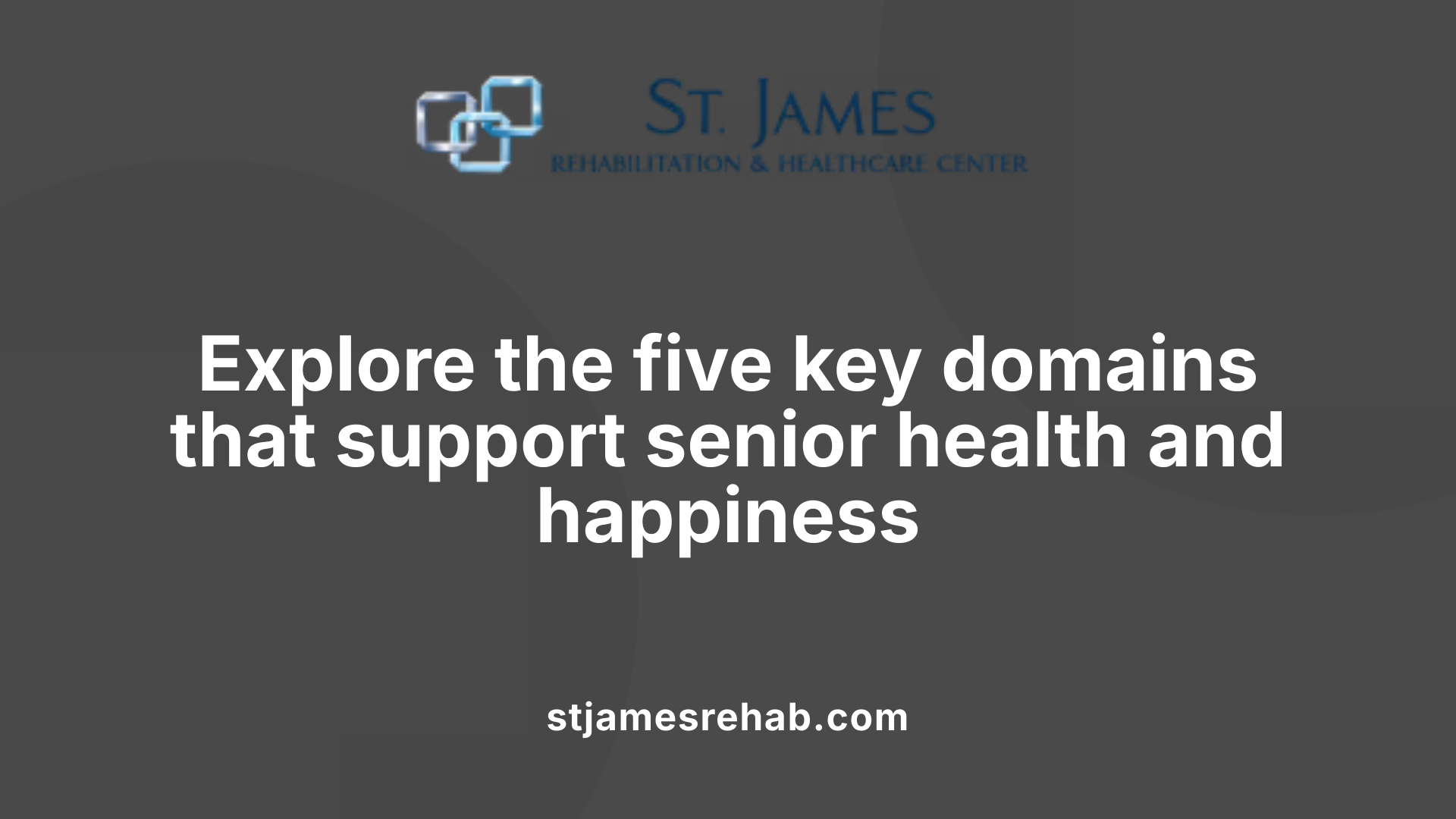
What are the five domains of recreational therapy and their importance for senior well-being?
Recreational therapy addresses five interconnected areas of health: physical, social, cognitive, emotional, and spiritual. Each domain plays a crucial role in supporting the overall well-being of older adults.
Physical health is maintained and improved through activities like swimming, yoga, walking, and strength training. These help enhance mobility, flexibility, balance, and strength, which are vital for preventing falls, managing chronic conditions, and promoting independence.
Social engagement involves group activities, community outings, or pet therapy, which help reduce feelings of loneliness and social isolation. Building social connections and feeling part of a community can significantly enhance mental health and emotional resilience.
Cognitive stimulation includes brain games, puzzles, drama, or creative arts. These activities promote memory, attention, problem-solving skills, and mental alertness, helping to slow cognitive decline and reduce the risk of dementia.
Emotional resilience is bolstered through music therapy, art, storytelling, and activities that foster self-expression. Such activities can lift mood, reduce depression and anxiety, and provide a sense of purpose and accomplishment.
Spiritual fulfillment can be nurtured with nature-based activities like gardening, as well as mindfulness, cultural outings, or religious practices. These help seniors find inner peace, purpose, and hope within their daily routines.
By focusing on these five areas, recreational therapy offers a comprehensive approach that enhances seniors' quality of life. Personalized programs consider individual abilities and preferences, fostering a holistic form of support.
| Domain | Activities Examples | Benefits | Additional Notes |
|---|---|---|---|
| Physical | Walking, swimming, yoga, dance | Improves mobility, strength, balance, fall prevention | Tailored to ability levels |
| Social | Group exercises, outings, pet visits | Reduces loneliness, enhances sense of belonging | Supports emotional health |
| Cognitive | Puzzles, brain games, arts & crafts | Maintains memory, attention, problem-solving | Helps slow cognitive decline |
| Emotional | Music, storytelling, creative writing | Boosts mood, self-esteem, emotional resilience | Provides avenues for emotional expression |
| Spiritual | Gardening, mindfulness, cultural outings | Fosters purpose, inner peace, hope | Enriches overall life satisfaction |
Understanding these interconnected domains underscores the importance of a balanced, personalized approach to senior care through recreational therapy. Each area supports and enhances the others, creating a foundation for aging with dignity, happiness, and health.
Why Recreational Therapy Is a Crucial Component of Senior Care
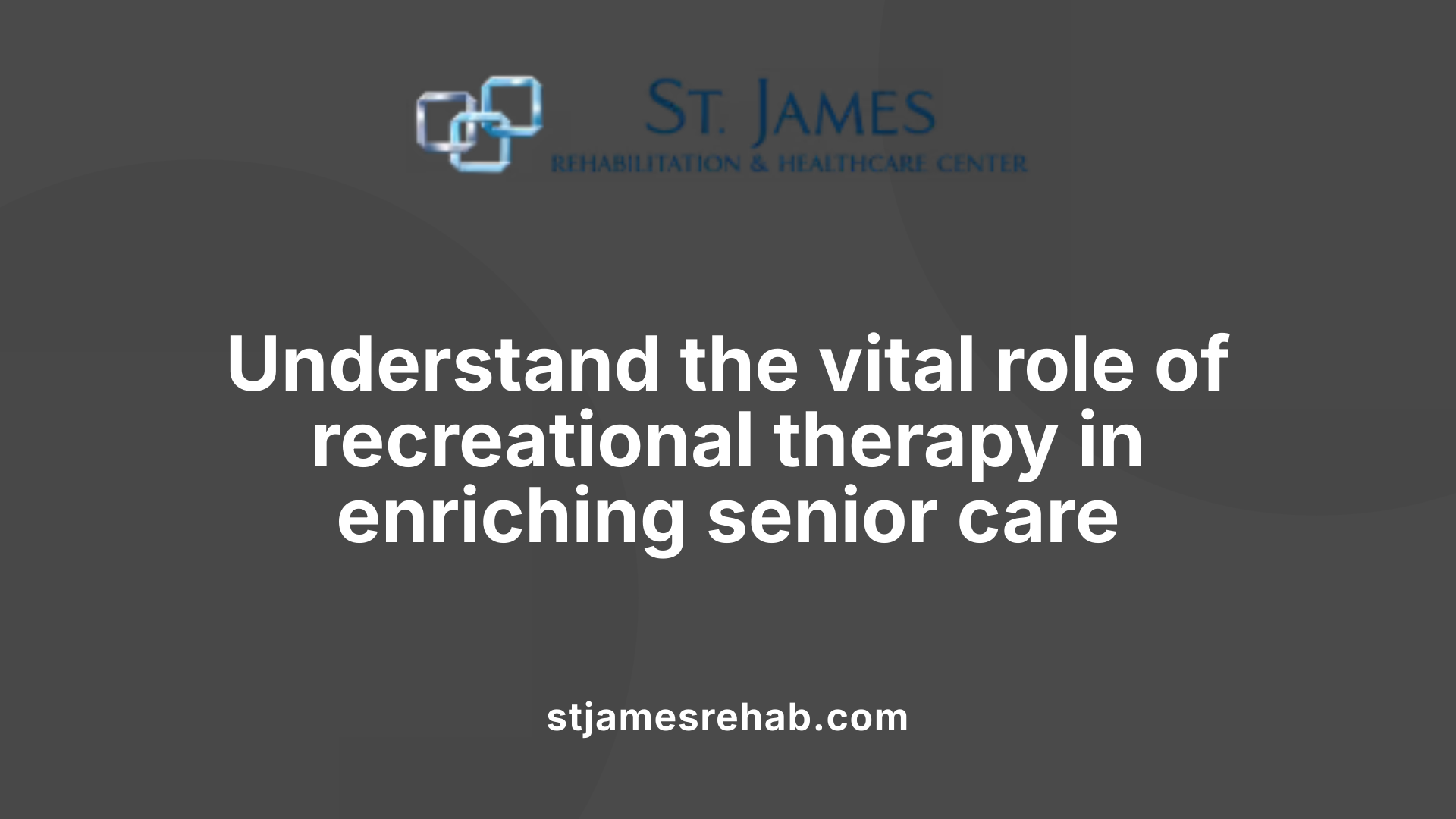
Why is recreational therapy important for older adults?
Recreational therapy plays a vital role in senior care by promoting social interaction, mental stimulation, and physical activity. These activities help seniors maintain their independence, improve their overall health, and enhance their quality of life.
Engaging in tailored activities such as arts and crafts, music therapy, gardening, or exercise not only fosters physical health but also encourages emotional well-being. For example, participating in group activities can help combat loneliness and reduce depression, which are common issues among older populations.
Additionally, recreational therapy supports cognitive health through brain exercises like puzzles or memory games, which can slow cognitive decline and potentially reduce the risk of dementia by up to 29%. The social aspects of these activities also help seniors develop friendships and a sense of community.
Importance of social interaction and mental engagement
Activities that stimulate social interaction and mental engagement are crucial for seniors. These interactions help build confidence, boost self-esteem, and promote a sense of belonging.
Group outings, team sports, and community-based programs foster social bonds and combat social isolation, a significant risk factor for many physical and mental health issues.
Mental challenges such as problem-solving tasks or creative writing also keep the brain active, contributing to better memory, concentration, and emotional resilience. Collectively, these activities help preserve cognitive functions and improve seniors' overall happiness.
Benefits of physical activity
Physical movement is a cornerstone of recreational therapy, offering benefits like improved mobility, strength, flexibility, and balance. Activities such as swimming, yoga, walking programs, and chair exercises are adapted to meet individual abilities.
Regular physical activity helps prevent falls, recover from health setbacks, and reduces anxiety and depression by lowering stress hormones.
Moreover, these exercises foster independence by maintaining the physical skills necessary for daily living. This independence, coupled with the physical and mental benefits, contributes to a more fulfilling and longer life.
Role in mental health and emotional recovery
Recreational therapy is pivotal in supporting mental health and emotional recovery. Activities like music therapy and pet interactions elevate mood, diminish anxiety, and stimulate memory.
They also provide meaningful routines and targets, which boost motivation and purposefulness. As a result, seniors experience reduced symptoms of depression and anxiety.
Engagement in leisure activities fosters resilience by creating a sense of achievement and emotional stability. These factors collectively help seniors navigate emotional challenges, recover from setbacks, and lead more joyful lives.
| Aspect | Activities | Benefits | Examples |
|---|---|---|---|
| Social Engagement | Community outings, group sports | Reduced loneliness, friendship | Art classes, social games |
| Physical Health | Yoga, swimming, walking | Improved strength, balance | Chair yoga, water aerobics |
| Cognitive Function | Puzzles, brain training | Memory and focus | Sudoku, crossword puzzles |
| Emotional Well-Being | Music therapy, pet therapy | Mood enhancement | Listening to music, dog visits |
Recreational therapy is a comprehensive approach that addresses multiple health dimensions, supporting seniors in aging with dignity and vitality.
Motivating Seniors to Stay Active and Engaged
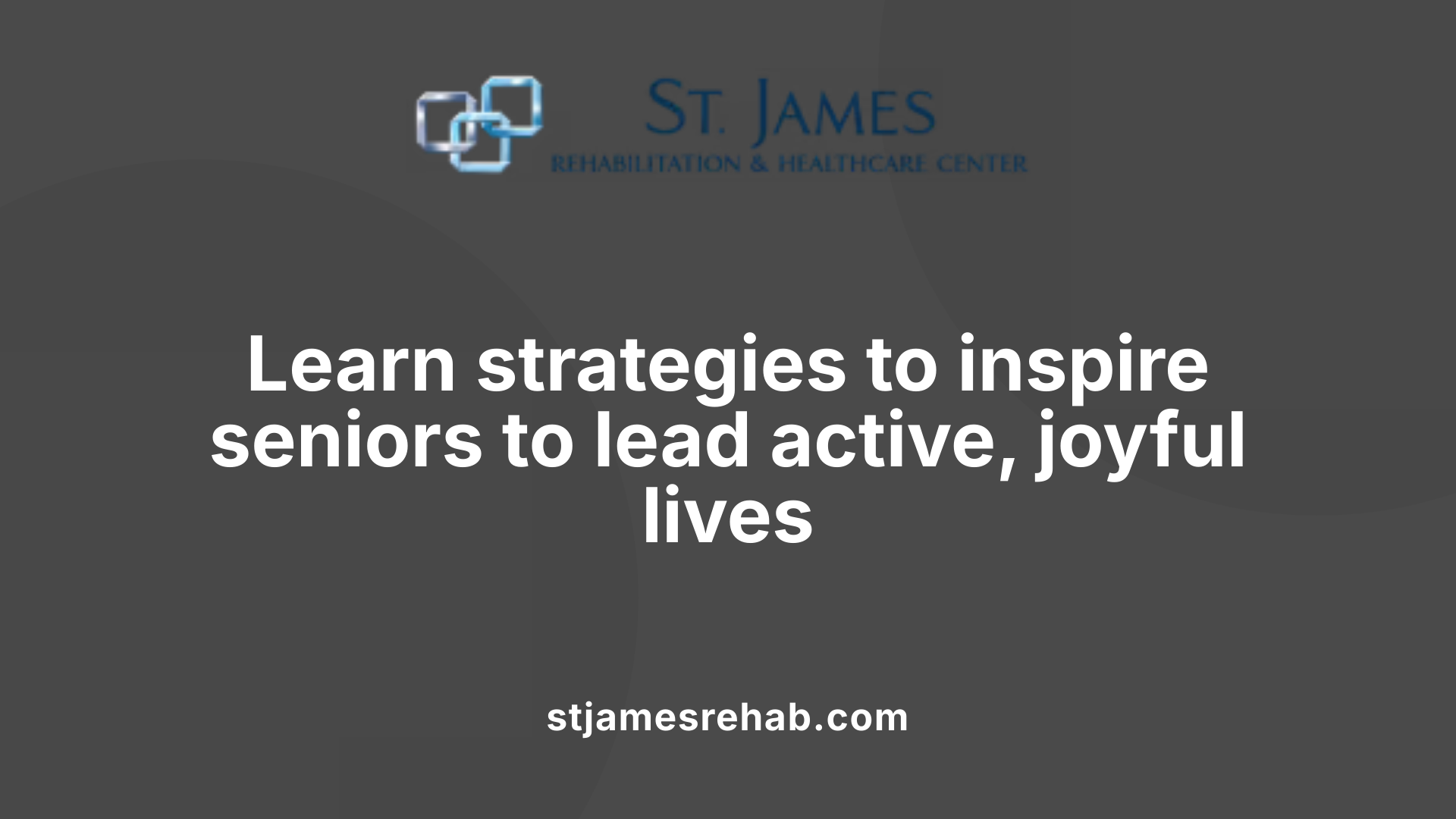
How can recreational therapy motivate seniors to stay active and engaged?
Recreational therapy encourages seniors to participate in activities that are enjoyable and tailored to their interests, making staying active feel natural and rewarding. Activities such as arts, music, dance, sports, and community outings are designed to match seniors’ abilities and preferences, fostering a sense of fun and purpose.
Engaging in these activities offers numerous physical health benefits. Exercises like walking, swimming, yoga, and tai chi improve mobility, strength, flexibility, and balance, which are crucial for maintaining independence and preventing falls.
Mental stimulation plays a vital role. Brain teasers, puzzles, memory games, and creative writing keep the mind active, helping to slow cognitive decline and preserve mental sharpness.
Social bonding is another powerful motivator. Group activities and community events create opportunities for seniors to connect, develop friendships, and feel part of a community. These interactions reduce loneliness and depressive symptoms.
Participation in meaningful hobbies and activities enhances a sense of purpose and personal fulfillment. Whether gardening, painting, or playing music, seniors gain confidence and joy, which motivates ongoing involvement.
Overall, recreational therapy acts as a comprehensive approach to support physical health, mental acuity, social connections, and emotional well-being, ultimately inspiring seniors to lead active, engaged lives.
Supporting Physical, Cognitive, Social, and Emotional Health Through Tailored Activities
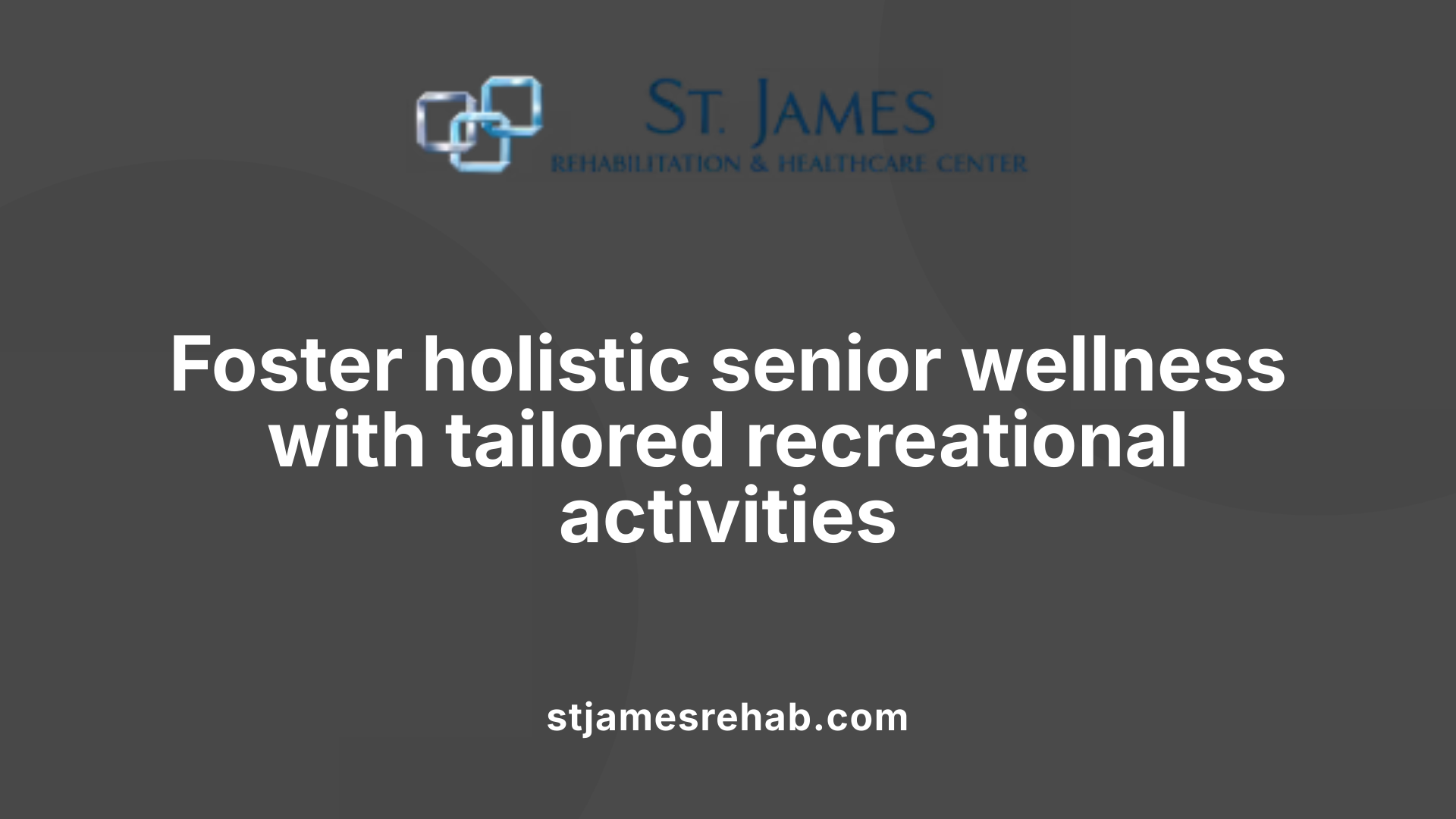 Recreational therapy includes a variety of activity-based interventions designed to address multiple aspects of seniors' health. Activities like exercise, arts, and sports help improve mobility, strength, flexibility, and balance, which are essential for fall prevention and maintaining independence. For example, yoga, swimming, or walking programs are common physical activities that boost physical fitness.
Recreational therapy includes a variety of activity-based interventions designed to address multiple aspects of seniors' health. Activities like exercise, arts, and sports help improve mobility, strength, flexibility, and balance, which are essential for fall prevention and maintaining independence. For example, yoga, swimming, or walking programs are common physical activities that boost physical fitness.
Cognitive exercises such as puzzles, memory games, brain teasers, and processing speed activities stimulate the brain, helping to improve memory, concentration, and problem-solving skills. Engaging in these mentally challenging tasks can slow cognitive decline and bolster mental acuity.
Social interactions are a fundamental part of recreational therapy. Group activities like community outings, arts classes, dance, and drama help seniors build social skills, make new friends, and foster a sense of community. These connections combat loneliness, which is linked to both depression and cognitive decline.
Emotional support is fostered through arts, music therapy, pet interactions, and group activities that promote self-expression and emotional resilience. Listening to music or engaging in creative arts can reduce stress, elevate mood, and decrease symptoms of anxiety and depression.
Certified Therapeutic Recreation Specialists (CTRS) tailor these activities to fit each senior’s abilities and needs, ensuring maximum benefit. This holistic approach encourages seniors to stay active, connected, and emotionally balanced, significantly enhancing their overall quality of life.
| Type of Activity | Focus Area | Examples | Benefits |
|---|---|---|---|
| Exercise & Movement | Physical health | Yoga, swimming, walking | Improve mobility, strength, balance, reduce fall risk |
| Brain Training | Cognitive health | Puzzles, memory games, Sudoku | Enhance memory, concentration, problem-solving |
| Social Activities | Social connection & community | Art classes, dance, outings | Reduce loneliness, foster community bonds |
| Arts & Music | Emotional well-being | Painting, music therapy | Reduce stress, elevate mood, boost emotional resilience |
A Wide Range of Suitable Recreational Activities for Seniors
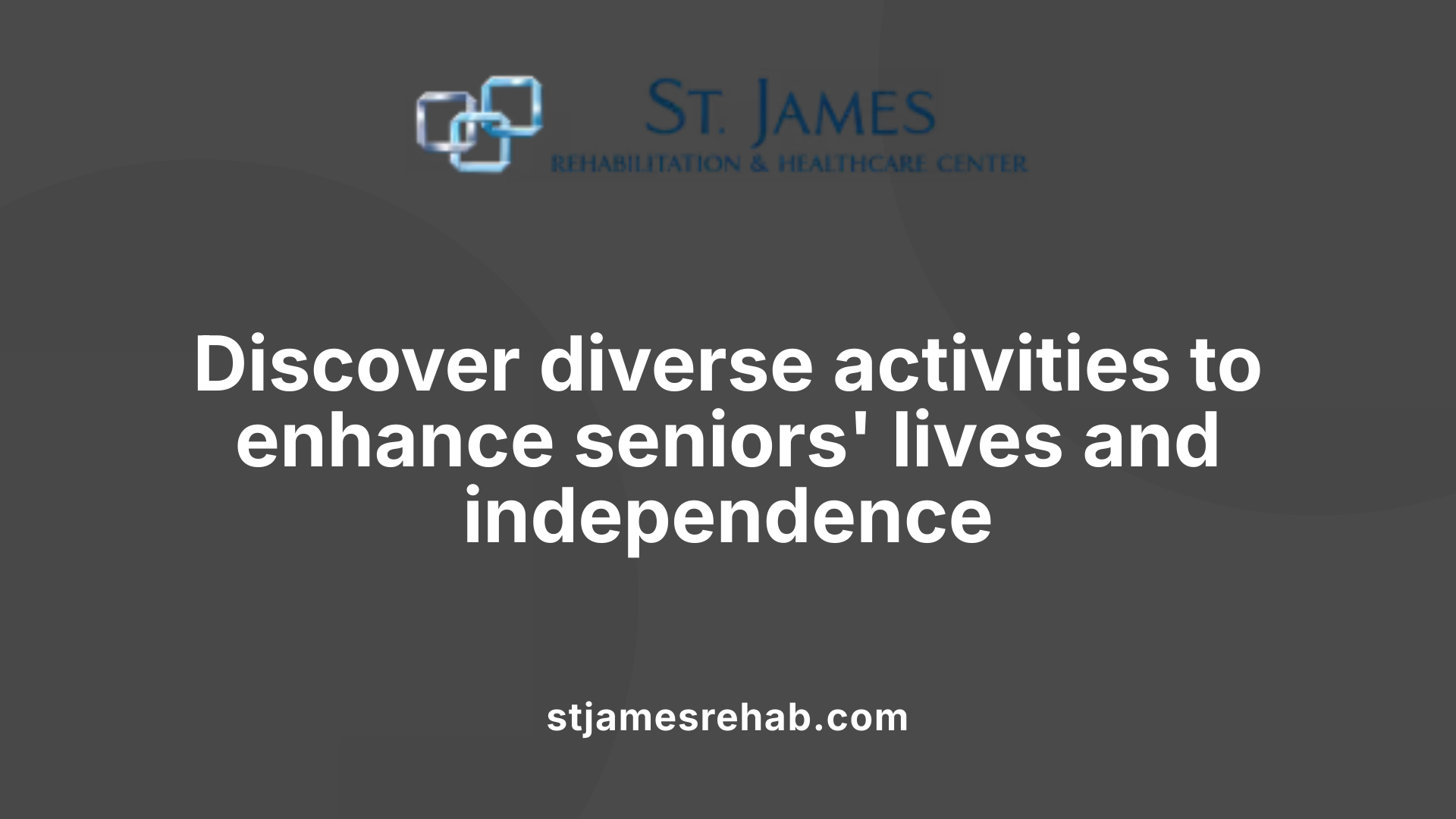
What types of recreational activities are suitable for seniors?
Recreational activities tailored for seniors are diverse, designed to support physical, mental, and emotional health. Outdoor pursuits like gardening, walking, hiking, and nature trips help seniors stay active and connected with nature. These activities improve mobility, strength, and flexibility, while also providing mental relaxation.
Indoor activities include arts and crafts, painting, knitting, cooking, and do-it-yourself projects. These help stimulate creativity, enhance fine motor skills, and foster a sense of accomplishment. Engaging in arts makes it easier for seniors to find joy and express emotions.
Group classes such as yoga, Tai Chi, water aerobics, and dance are excellent ways to enhance mobility, improve balance, and boost cardiovascular health in a safe environment. These activities often incorporate social elements, encouraging interaction and reducing feelings of loneliness.
Social activities like book clubs, community events, live music performances, virtual game nights, and volunteering opportunities promote socialization. Building connections within communities can significantly mitigate social isolation and boost emotional well-being.
Mentally stimulating exercises are crucial for cognitive health. Puzzles, reading, attending lectures, or engaging in life story exercises stimulate the brain, improve memory, and increase overall mental acuity.
The variety of these activities allows for adaptations based on individual mobility and interests, guaranteeing a personalized approach to senior wellness. They collectively contribute to a higher quality of life, promoting independence, happiness, and emotional resilience.
| Activity Type | Examples | Benefits |
|---|---|---|
| Outdoor Activities | Gardening, nature walks, hiking | Physical health, emotional relaxation, connection with nature |
| Indoor Creative Pursuits | Arts and crafts, cooking, knitting | Cognitive stimulation, fine motor skill improvement |
| Group Classes | Yoga, Tai Chi, water aerobics | Balance, flexibility, cardiovascular health |
| Social Activities | Book clubs, community events | Social engagement, emotional support |
| Mentally Stimulating Exercises | Puzzles, reading, lectures | Memory, attention, problem-solving skills |
By incorporating a range of activities suited to individual preferences, seniors can enjoy a vibrant, active, and fulfilling lifestyle.
Promoting Active Aging and Social Connection Through Recreational Therapy
Recreational therapy offers a comprehensive, engaging approach to support seniors in maintaining their health, independence, and zest for life. By integrating activities that address physical, mental, social, emotional, and spiritual needs, it not only enhances overall quality of life but also reduces risks associated with aging, such as falls, cognitive decline, and social isolation. With professional guidance tailored to individual capabilities and interests, recreational therapy keeps seniors motivated, empowered, and connected—ensuring they age with dignity, joy, and vitality.
References
- How Recreational Therapy Can Help Seniors Stay Active and ...
- 6 Ways Recreational Therapy Helps Seniors | Nurse Next Door
- Recreational Therapy: A Path to Holistic Well-Being for Seniors
- Exploring the Impact of Recreational Therapy on Senior Care
- Recreational therapy | EBSCO Research Starters
- The Importance of Recreational Therapy for Senior Citizens
- How Recreational Therapy Enriches the Lives of Older Adults





